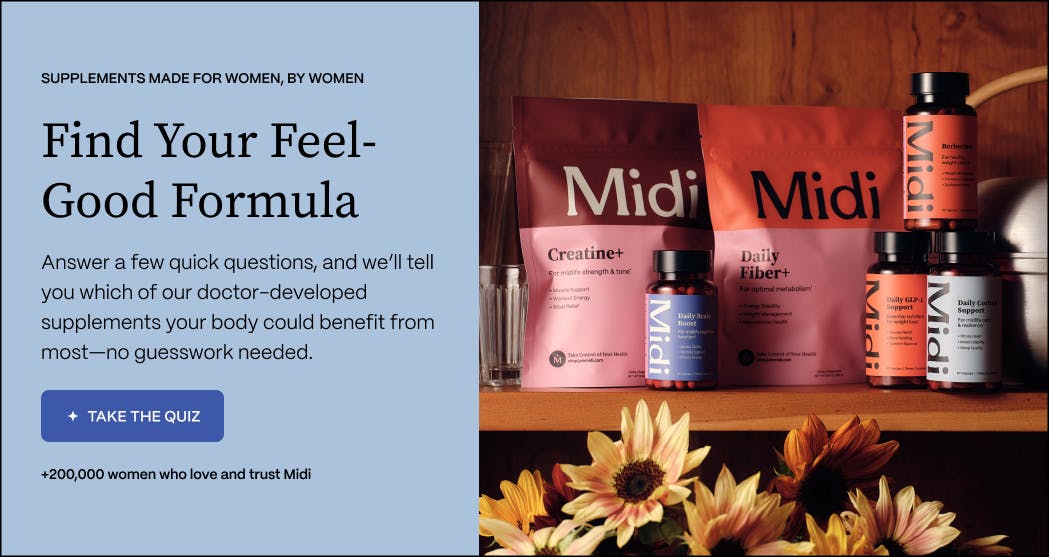While clinical studies show that hormone replacement therapy (HRT) can be enormously effective for improving symptoms caused by perimenopause and menopause, non-hormonal treatments for menopause can still work wonders for many women. Midi clinicians are trained to develop holistic Care Plans, which can include non-hormonal solutions, based on your health history and preferences.
The menopause buzz may be strong around hormone therapy, but if you're curious about non-hormonal treatments for menopause, you may be surprised to learn you've got options. Whether it's a personal preference or for medical reasons, there are many non-hormonal treatments that are effective and safe for helping manage symptoms like hot flashes, sleep issues, and mood changes. Besides, many women choose to combine hormonal and non-hormonal treatment to holistically address the menopausal transition. No matter where you fall, we’ve got you covered. Read on to explore the lifestyle shifts, nutrition changes, prescription medications, supplements, and mind-body therapies that clinically address menopause without hormones.
Why Some Women Avoid Hormonal Therapies
HRT, also called hormone therapy (HT) or menopausal hormone therapy (MHT), is considered the first-line therapy for hot flashes, according to the Menopause Society, the leading organization for menopause care. That said, this does not make HRT the right choice for everyone. As the Menopause Society notes, some women may not be the right candidates for HRT, including women who have:
- Some forms of breast or uterine cancer
- Unexplained uterine bleeding
- Liver disease
- A history of blood clots
- Cardiovascular disease
While these issues may not always represent hard stops for hormone therapy, they often involve more nuanced decision making and, in these cases, having additional treatment options can be helpful.
In addition, some women have a personal preference for avoiding HRT. A 2023 review in Menopause on women’s perceptions of HRT found that many were concerned about side effects and had a negative perception of hormone therapy from family and friends. If this is what's holding you back, keep in mind that a lot of the fear over HRT is outdated and misinformed.
Hormone replacement therapy came under fire after a 2002 Women’s Health Initiative (WHI) study linked taking estrogen plus progestin hormone replacement therapy to an increased risk of breast cancer and heart disease. Not surprisingly, women panicked and most doctors stopped prescribing HRT altogether.
That was 20 years ago, and these days, we know much more about HRT. For one thing, we know that the WHI was designed to study the prevention of chronic diseases, not to look at the prevention of hot flashes and other hormonally-driven symptoms of menopause. Moreover, the 2002 findings were misrepresented. In fact, a large body of recent research shows that if women start hormone replacement therapy within 10 years of their last period, not only do they enjoy significant relief from menopausal symptoms but they also have a lower risk of heart disease and bone loss. HRT may also be connected to decreased risk of diabetes and weight gain.
With the dozens of possible menopause symptoms, it’s clear that every woman experiences menopause differently. The availability of a multitude of menopausal treatments—and more coming down the pipeline—allow you to build an individualized plan. It’s now possible to achieve menopause relief without hormones.
Non-Hormonal Medications for Menopause Symptoms
HRT isn’t the only med in town that targets various menopause symptoms. Here’s a list of potential non-estrogen menopause treatments that can help you feel better:
- SSRIs and SNRIs: Traditionally used as anti-depressant medications, these drugs have been found to be effective for vasomotor symptoms. A few options in this category include citalopram (Celexa), Escitalopram (Lexapro), and venlafaxine, which is indicated for women with breast cancer.
- Gabapentin: This med is typically Rx’d as a treatment for seizures, nerve pain, and restless legs syndrome. It does this by calming "excitatory neurons” in the brain—and it’s been shown to reduce the frequency and duration of hot flashes compared to placebo, though it can cause side effects like dizziness.
- Fezolinetant (Veozah): One of the newer types of drugs for hot flashes, this med—FDA-approved in 2023—is a type of neurokinin 3 (NK3) receptor antagonist that blocks the activity of the NK3 receptor in the brain. Ultimately, this helps regulate body temperature. Another recently FDA-approved option in this class—elinzanetant—is expected to be available soon. Oh, and bonus: They help sleep, too.
Lifestyle and Behavioral Approaches
Treating menopause doesn’t always require popping a pill. If you prefer to stay away from medication, there are several lifestyle approaches that have been shown to decrease symptoms and help you feel great overall:
- CBT: Cognitive behavioral therapy (CBT) is a technique you may be familiar with if you’ve tried therapy. In part, it involves reframing unhelpful thoughts, changing maladaptive behaviors, and determining coping strategies. For example, the experience of a hot flash can be really distressing–so much so that when you feel one coming on, the anxiety and fear associated with it can trigger a sense of panic that makes symptoms worse. CBT can help you approach symptoms in a way that makes them less impactful and improves your quality of life, research shows. In addition to dealing with vasomotor symptoms, the therapy specifically excels in improving sleep and anxiety and depression during the menopausal transition.
- Exercise and movement: Physical activity has been called “medicine” and the fountain of youth—and for good reason. Regular exercise improves mood, sleep, and menopausal symptoms. Plus, some of that exercise is of the strength-training variety, you’ll also maintain muscle mass, which has benefits for bone health, achieving a healthy weight and reducing visceral (belly fat), and improving general mobility as you age.
- Stress management and mindfulness: De-stressing is certainly a big ask in midlife, but it’s worth it. Practices like meditation, yoga, and deep breathing help regulate stress hormones (such as cortisol) and improve your quality of life. In a 2025 study, women who completed seven mindfulness sessions had an improvement in vasomotor symptoms, as well as psychological, physical, and sexual health compared to a control group who only received health education. The women in the mindfulness group had less stress, anxiety, and depression.
Dietary Strategies and Nutrients
Although weight gain in menopause is a concern for many women, you don’t need to go on a wildly restrictive diet to maintain a healthy weight. Following a Mediterranean-style diet may help manage hot flashes and night sweats—plus, many of the foods in the balanced eating pattern feature nutrients that are good for you in midlife in other ways like:
- Plant-based phytoestrogens: Foods like soy and flaxseed have mild estrogen-like effects that can help quell symptoms.
- Omega-3 fatty acids: Found in fatty fish like salmon, herring, and sardines, as well as plant sources like chia, hemp, and flax, this type of unsaturated fat can help support cardiovascular, mood, and cognitive health.
- Vitamin D and calcium: As estrogen declines in menopause, bone loss speeds up. Given one half of postmenopausal women has osteoporosis (a disease of bone loss that increases the risk of fracture), doing what you can to shore up your skeleton during midlife is key for quality of life as you age. Calcium keeps bones strong, while vitamin D helps your body absorb calcium. Dairy products, some fortified foods (like plant-based milks), and small fish (like sardines) are some options with this bone-building duo.
Supplements for Menopause Support (Hormone-Free)
Many supplement products promise natural menopause relief. Here are a few that have the best evidence behind them and ones we recommend the most often:
- Black Cohosh: This herb is believed to act on serotonin, a neurotransmitter that plays a role in sleep, mood, and digestion. Although there is conflicting evidence, black cohosh may be helpful in reducing hot flashes and night sweats. It’s also anti-inflammatory, so the herb may also decrease joint pain and stiffness present during menopause.
- Evening Primrose Oil: Although evidence is mixed on the effectiveness of EPO for menopause symptoms, some data suggest that evening primrose oil may help reduce period-related breast pain in premenopausal women, possibly due to its anti-inflammatory properties.
- Ashwagandha and Rhodiola: Known as adaptogens, these herbs are known for helping boost your body’s resilience against stress. Although there are many adaptogens, ashwagandha, in particular, has been shown to relieve mild to moderate menopausal symptoms compared to a placebo. One study on a supplement that combined both black cohosh and rhodiola found that the combination was better at reducing psychological symptoms compared to black cohosh alone or a placebo.
- Red clover: This plant is rich in natural compounds called isoflavones—phytoestrogens that mimic the effects of estrogen in the body—which can help ease some of the most common symptoms of menopause. Research suggests red clover may help reduce the frequency and severity of hot flashes and night sweats, and support bone health.
- Siberian rhubarb: Also known as rhapontic rhubarb, this is an extract from the roots of a plant called Rheum rhaponticum. Siberian rhubarb root in its standardized form, Err 731™, has been shown in clinical studies to help ease the severity of menopause symptoms.
- Magnesium: The mineral is important for metabolic health and also can help regulate inflammation in the body, but levels may decrease during perimenopause and menopause as estrogen declines, research suggests. That’s why there’s been growing attention on the importance of this mineral in mid-life. Magnesium levels that fall too much are associated with symptoms like irritability and fatigue.
Complementary Therapies
In addition to the treatments above, the below can be part of an integrated approach to menopause therapy:
- Acupuncture: Although acupuncture may not change estrogen levels, it has been suspected to be an effective hormone-free menopause treatment, as it may modulate neurotransmitters that affect mood, thus decreasing depressive symptoms during menopause and may ease hot flashes and insomnia.
- Massage and bodywork: Aside from being generally relaxing, massage may make a difference for your symptoms. One study that looked at connective tissue massage (where a massage therapist focuses on the facia, or connective tissue, during treatment) found that women benefitted from reduced hot flash severity and frequency and an improved mood and quality of life compared to sham (fake) massage. Fascia is thought to be sensory tissue that, when manipulated through massage, may regulate the nervous system response (pushing you more toward relaxation), decrease stress hormones, and boost the production of feel-good hormones.
- Cooling products and tech: From wearable fans to cooling pillows and temperature-regulating bedding, these options can help decrease hot flashes and night sweats when they happen. Of course, these won’t prevent hot flashes, but they can be part of an overall strategy to stop hot flashes fast.
When You Should Consider Hormonal Therapy
Depending on your symptoms—and what’s bothering you the most (again, it’s a big potential list!), HRT might be the right option for you.
Keep in mind that there are two main forms of HRT, including:
- systemic: the hormone affects the tissues throughout the body and can therefore be useful for a variety of symptoms
- non-systemic (or local/vaginal): the hormone affects vaginal tissues only and is not absorbed into the bloodstream
Even if you are not the right candidate for systemic HRT or wish to avoid it, local hormone therapy might be a good choice for you if you’re dealing with the Genitourinary Syndrome of Menopause (GSM), including symptoms like incontinence, vaginal dryness, discomfort during sex, and more.

Sometimes HRT may be used in lieu of the other treatments or it may be combined with them. Healthy lifestyle habits like good sleep, exercise, stress management, and a balanced diet are always recommended no matter what hormonal or non-hormonal treatments you’re using.
True Stories of Transformation
When to See a Healthcare Professional
Menopause is a natural transition—but experiencing life-disrupting symptoms does not have to be the norm. We’re so lucky that there are many options available to us for symptom relief, including hormonal and non-hormonal treatments for menopause.
If your menopause symptoms are affecting your quality of life (your sleep, work, hobbies, or relationships, for example) or you’re not sure what treatment options are right for you, schedule a visit with a Midi clinician for a flexible, respectful, and personalized Care Plan that balances your symptom needs with your treatment values.
Key Takeaways
- There are many non-hormonal treatments that are effective and safe for helping manage symptoms like hot flashes, sleep issues, low libido, mood changes, and more.
- While HRT, also called hormone therapy (HT) or menopausal hormone therapy (MHT), is considered the first-line therapy for hot flashes, according to the Menopause Society, non-hormonal options are available for relief.
- Many women choose to combine hormonal and nonhormonal treatment to holistically address the menopausal transition.
- Some women may not be the right candidates for HRT, including women who have some forms of breast or uterine cancer, unexplained uterine bleeding, liver disease, a history of blood clots, or cardiovascular disease.
Frequently Asked Questions (FAQs)
How to handle menopause without hormones?
There are several non-hormonal treatments for menopause available, including non-hormonal medications like SSRI/SNRII or NK3 inhibitors for hot flashes and night sweats, supplements like black cohosh, lifestyle approaches like dietary choices, exercise, and mindfulness, and complementary therapies like acupuncture.
Can menopause be treated naturally?
If natural treatments are referred to as lifestyle adjustments, dietary changes, and certain supplements, there are very good options that have been shown to improve quality of life during the menopausal transition. However, hormone replacement therapy is not “unnatural.” In fact, it is providing your body with small amounts of the hormones estrogen and/or progesterone that are declining during the transition.
What can you take for menopause if you can't take hormones?
Depending on your symptoms, options include non-hormonal medications like citalopram (Celexa), Escitalopram (Lexapro), gabapentin, and fezolinetant (Veozah). As for supplements, black cohosh, evening primrose oil, ashwagandha, rhodiola, and magnesium may be options for you.
What is the new non-hormonal menopause treatment?
One of the most exciting on the market is in a class of drugs called NK3 receptor agonists. The first, fezolinetant (Veozah) was FDA-approved in 2023 for the treatment of vasomotor symptoms (hot flashes/night sweats). It works in an area of the brain involved in temperature regulation.
If you’re in perimenopause or menopause and want guidance from clinicians who specialize in women’s midlife health, book a virtual visit with Midi today.
Hormonal change is at the root of dozens of symptoms women experience in the years before and after their period stops.
Our trained menopause specialists can help you connect the dots to guide you towards safe, effective solutions.
Whether you need personalized guidance or a prescription routine to tackle symptoms—including vaginal dryness and irritation, brain fog, hot flashes, sleep trouble, mood swings, and weight gain—we’ve got you covered.
Midi’s mission is to revolutionize healthcare for women at midlife, wherever they live and whatever their health story. We believe that starts with education, to help all of us understand our always-changing bodies and health needs. Our core values guide everything we do, including standards that ensure the quality and trustworthiness of our content and editorial processes. We’re committed to providing information that is up-to-date, accurate, and relies on evidence-based research and peer-reviewed journals. For more details on our editorial process, see here.







